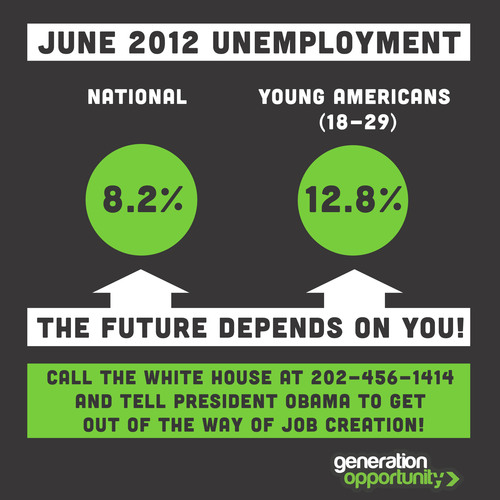NEWSMAX
George P. Bush: Obama's Economic Policies Have Hurt the Young
by Newsmax Wires
July 10, 2012
President Barack Obama’s economic policies have resulted in hard times for the nation’s young adults, says George P. Bush, son of former Florida Gov. Jeb Bush and co-chairman of Maverick PAC.
Millions of young Americans were inspired by Obama’s 2008 campaign, Bush writes in a Politico opinion piece co-authored by Brad Dayspring, senior adviser to the YG Action Fund. About two-thirds of Americans under 30 voted for Obama, “propelling him to a historic victory,” they say.
But since then things have taken a definite turn for the worse. “Young Americans have been hurt disproportionally in the Obama economy,” the duo writes.
“Unemployment for college graduates under age 25 has averaged 9.4 percent over the past year . . . Young women still earn less than young men — regardless of their educational background.”
The bleak economy is forcing young adults to cast their life and career dreams aside, Bush and Dayspring argue. “Half of Americans age 18 to 34 say they’ve taken a job they did not want just to pay the bills, according to the Pew Research Center, and one in three has postponed getting married or having a baby.”
Obama has discouraged small business creation by making it “more costly, difficult, and bureaucratic,” the authors write. “His words and now his campaign ads have pitted Americans against one another and criticized businessmen and women for being successful.”
Read more on Newsmax.com: George P. Bush: Obama’s Economic Policies Have Hurt the Young
Millions of young Americans were inspired by Obama’s 2008 campaign, Bush writes in a Politico opinion piece co-authored by Brad Dayspring, senior adviser to the YG Action Fund. About two-thirds of Americans under 30 voted for Obama, “propelling him to a historic victory,” they say.
But since then things have taken a definite turn for the worse. “Young Americans have been hurt disproportionally in the Obama economy,” the duo writes.
“Unemployment for college graduates under age 25 has averaged 9.4 percent over the past year . . . Young women still earn less than young men — regardless of their educational background.”
The bleak economy is forcing young adults to cast their life and career dreams aside, Bush and Dayspring argue. “Half of Americans age 18 to 34 say they’ve taken a job they did not want just to pay the bills, according to the Pew Research Center, and one in three has postponed getting married or having a baby.”
Obama has discouraged small business creation by making it “more costly, difficult, and bureaucratic,” the authors write. “His words and now his campaign ads have pitted Americans against one another and criticized businessmen and women for being successful.”
Read more on Newsmax.com: George P. Bush: Obama’s Economic Policies Have Hurt the Young

TOWN HALL
Budget Insanity
by John Stossel
July 11, 2012
Last year, Congress agreed to $1.2 trillion in automatic spending cuts, unless politicians find other things to cut. They didn't, of course. So now, with so-called sequestration looming in January, panic has set in. Even the new "fiscally responsible" Republicans vote against cutting Energy Department handouts to companies like Solyndra and subsidies to sugar producers. Many claim that any cut in military spending will weaken America and increase unemployment.
It's another demonstration of the politicians' addiction to spending -- and how we are complicit. "One more infrastructure bill" or "this jobs plan" will jumpstart the economy, and then we'll kick our spending addiction once and for all.
But we don't stop.
For most of American history, government was tiny. But since Lyndon Johnson's Great Society and the promise that government would cure poverty, spending has gone up nonstop. This is not sustainable.
Progressives say: If you're so worried about the deficit, raise taxes! But it's a fantasy to imagine that taxing the rich will solve our deficit problem. If the IRS grabbed 100 percent of income over $1 million, the take would be just $616 billion. That's only a third of this year's deficit.
It's the spending, stupid.
Even if you could balance the budget by taxing the rich, it wouldn't be right. Progressives say it's wrong for the rich to be "given" more money. But money earned belongs to those who earn it, not to government. Lower taxes are not a handout.
That's the moral side of the matter. There's a practical side, too. Taxes discourage wealth creation.
Even if you think -- despite all evidence -- that government spends money more usefully than people in the private sector, there is a limit to how much government can tax before people work less or flee.
Progressives claim a small increase in tax rates won't stop the wealthy from producing. But some would stop. When the top marginal rate was 90 percent, actor Ronald Reagan worked just half the year. He said that woke him up to the damage that high taxes impose.
Higher taxes give rich people and politicians more reasons to collude. The rich make contributions, and politicians pay the rich back by giving them tax loopholes.
That's a big loss to America. That money and creative energy spent on figuring out taxes might have gone to build new products, make music, cure cancer or ... who knows what?
Politicians promise to balance the budget by getting rid of what is wasteful, redundant or unnecessary. There's plenty of that, but they have promised to eliminate it for years. They cannot. It's just in the nature of the beast. Centrally planned monopolies do things that are wasteful, redundant and unnecessary.
Read more: http://bit.ly/O4WtGV

No comments:
Post a Comment